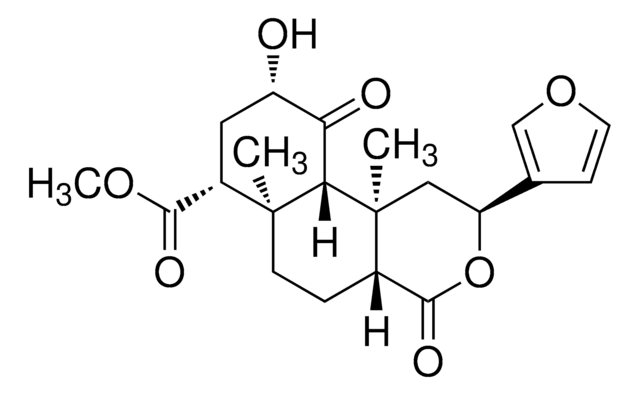S8071
Salvinorin A
≥98% (HPLC), solid
Synonym(s):
(2S,4aR,6aR,7R,9S,10aS,10bR)-9-(acetyloxy)-2-(3-furanyl)dodechydro-6a,10b-dimethyl-4,10-dioxo-2H-naphtho[2,1-c]pyran-7-carboxylic acid methyl ester
Select a Size
Select a Size
About This Item
Recommended Products
Quality Level
Assay
≥98% (HPLC)
form
solid
drug control
regulated under CDSA - not available from Sigma-Aldrich Canada
storage condition
protect from light
color
white
solubility
DMSO: ≥10 mg/mL
ethanol: ~3 mg/mL
storage temp.
−20°C
SMILES string
[H][C@@]12CC[C@@]3(C)[C@@H](C[C@H](OC(C)=O)C(=O)[C@]3([H])[C@@]1(C)C[C@H](OC2=O)c4ccoc4)C(=O)OC
InChI
1S/C23H28O8/c1-12(24)30-16-9-15(20(26)28-4)22(2)7-5-14-21(27)31-17(13-6-8-29-11-13)10-23(14,3)19(22)18(16)25/h6,8,11,14-17,19H,5,7,9-10H2,1-4H3/t14-,15-,16-,17-,19-,22-,23-/m0/s1
Looking for similar products? Visit Product Comparison Guide
Application
Biochem/physiol Actions
Features and Benefits
Storage Class Code
11 - Combustible Solids
WGK
WGK 3
Flash Point(F)
Not applicable
Flash Point(C)
Not applicable
Personal Protective Equipment
Choose from one of the most recent versions:
Already Own This Product?
Find documentation for the products that you have recently purchased in the Document Library.
Customers Also Viewed
Our team of scientists has experience in all areas of research including Life Science, Material Science, Chemical Synthesis, Chromatography, Analytical and many others.
Contact Technical Service






